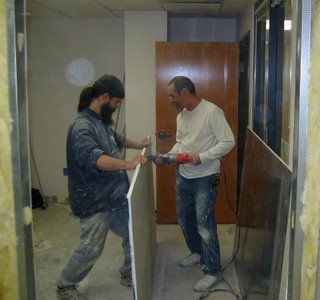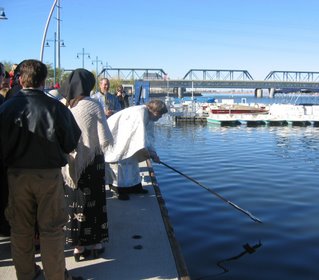The following is an article from the Seattle Times. It is a completely secular validation of what the Scriptures and the Fathers tell us:
"Self-knowledge is needful; this is the knowledge of oneself and especially of the limitation of one's talents, one's failings, and lack of skill. Abbot Nazarius
"Our greatest protection is self-knowledge, and to avoid the delusion that we are seeing ourselves when we are in reality looking at something else. This is what happens to those who do not scrutinize themselves. What they see is strength, beauty, reputation, political power, abundant wealth, pomp, self-importance, bodily stature, a certain grace of form or the life, and they think that this is what they are. Such persons make very poor guardians of themselves: because of their absorption in (the false images), they overlook what is their (true self) and leave it unguarded. How can a person protect what he does not know? The most secure protection for our treasure is to know ourselves: each one must know himself as he is, and distinguish himself from all that is not he, that he may not unconsciously be protecting something else instead of what is truly himself." St. Gregory of Nyssa.
Since the time of the transgression of our forefather, despite the weakening of our spiritual and moral powers, we are wont to think very highly of ourselves. Although our daily experience very effectively proves to us the falseness of this opinion of ourselves, in our incomprehensible self-deception we do not cease to believe that we are something, and something not unimportant. Yet this spiritual disease of ours, so hard to perceive and acknowledge, is more abhorrent to God than all else in us, as being the first offspring of our self-hood and self-love, and the source, root and cause of all passions and of all our downfalls and wrong-doing. It closes the very door of our mind or spirit, through which alone Divine grace can enter, and gives this grace no way to come and dwell in a man. (From Unseen Warfare)
_________________________________________________________________
Does Your Mirror Lie?
How people view their appearance, smarts and importance rarely reflects the truth
Story by Kyung M. Song,
The Seattle Times
David Dunning played the cello seriously as a teen - and he thought himself quite talented.
Then Dunning heard a recording by Jacqueline du Pre, the late English cellist who was renowned for playing with a brilliant ferocity. "So that's what you do with that instrument," a chastened Dunning, now professor of psychology at Cornell University, recalls thinking. "I had no clue that you could do that with the cello."
Dunning's epiphany was a classic example of a phenomenon familiar to social psychologists: flawed self-assessment. People - as researchers have documented again and again - systematically misjudge their competence, virtues, relevance and future actions. And those erroneous views can, researchers say, endanger health, ruin relationships, dent finances and cause other misery.
People generally consider themselves smarter, luckier, better looking and more important than they really are. They regard themselves as exceptional and believe that they will avoid the divorces, premature deaths or weight gains that befall everyone else.
Self-serving biases permeate people's perceptions. They claim credit for good deeds and successes but shift blame to others for their failures. A Toronto motorist captured this tendency on an insurance form: "A pedestrian hit me and went under my car."
"Most of us have a good reputation with ourselves," says David Myers, a professor at Hope College in Holland, Mich., who wrote the textbook, Social Psychology.
Blissful incompetence
People's high self-regard tends to be unjustified, social psychologists say. The link between people's personal estimations and the not-so-flattering reality is sometimes perilously weak.
Researchers at Australia's University of New England reviewed 128 studies in 1982 and calculated that people's perceptions of their intelligence versus their actual performance on tests and academic tasks had an average correlation of less than .3. A perfect correlation is 1.
In another study, in 1977, 94 percent of college professors ranked themselves as above average, even though by definition only 50 percent can be in the top half.
The least skilled people have the most exaggerated sense of their abilities. Dunning and a colleague conducted several studies to test theories about incompetence and inflated self-assessment.
Forty-five Cornell undergraduates took tests on logical reasoning and estimated how their test scores would compare to that of their classmates. The students who performed in the top quartile lowballed their actual scores and rankings. But those in the bottom quartile were grossly off mark. They misjudged that their scores would fall at the 62nd percentile instead of the actual 12th percentile.
Conclusion: Incompetent people are doubly handicapped because they lack not only the requisite skills but the ability to recognize their own deficiencies.
Intuition is dead wrong
People's self-perceptions fail in other ways, too. Often they are guilty of unwarranted optimism. People believe themselves invulnerable to bad fortunes, whether picking losers in the stock market or catching sexually transmitted diseases. Marriage-license applicants correctly guessed in a survey published in Law and Human Behavior that half of marriages end in divorce. Yet most of the 137 would-be betrothed put chances of their own marital dissolution at zero percent.
People are egocentric. They think their actions, absences and contributions are much more conspicuous than they actually are. Social psychologists have dubbed this the "spotlight effect." Students ushered into rooms while wearing T-shirts emblazoned with a large photo of Barry Manilow (attire researchers verified most college students consider mortifying) guessed that twice as many of their classmates would take note as actually did. Other people are more oblivious to our appearances, emotions and behaviors than we imagine. Stewing silently against a colleague? Chances are he barely has a clue.
People also think their virtues uncommon but their failings typical. Tax cheaters believe everyone else cheats, too. An infatuated person, Myers says, assumes the other reciprocates the feelings. People who drink heavily but buckle up in the car bolster their self-image by underestimating how many other people use seat belts. As the Talmud says, "We do not see things as they are. We see things as we are."
Consequences in life
Some social psychologists argue that shortcomings in self-assessment in laboratories are inconsequential or artificial. But researchers amassed persuasive data showing that people - at least North Americans - commit systematic errors in perceptions that can jeopardize their health, sabotage careers and even world peace.
People with unrealistic optimism are less likely to say they intend to get a flu shot. They are more likely to chance high-risk sex or disregard doctors' orders. They also risk wasting money on gym memberships by overestimating how often they will work out, Dunning said, or by miscalculating how carefully they will monitor their cellphone minutes.
Grades, too, can suffer. Children who can realistically gauge their own learning do better on exams. Fifth- and seventh-graders in an experiment published in Journal of Experimental Child Psychology bore this out. They devoted less time to easy booklets and focused their studies on the difficult ones. First- and third-graders, in contrast, underestimated the effort required to memorize the more difficult booklets and split their attention evenly among the booklets. The result: the younger students fared worse than the older students on subsequent tests.
Employees with flawed self-views might reject their supervisor's valid, but negative, reviews. Then they feel cheated with their "paltry" raises. Husbands and wives separately tallying how much each contributes to household chores produce estimates that add up to more than 100 percent.
Inflated self-views aren't all bad. They can buffer people from stress and depression and motivate them to keep after challenging tasks, Myers says. But on the whole, Myers contends, errors in perception bear blame for much of life's disharmony.
"It's at the root of many divorces, as both partners see themselves as contributing more and benefiting less than their counterparts," Myers says. "And it's endemic to many conflicts, where each side thinks its motives are virtuous."
Reality check
So, how do you get a true, or at least truer, picture of yourself? One way may be a "self-regulation" model professor Glenn Regehr and colleagues at the University of Toronto Faculty of Medicine are promoting. It involves medical professionals seeking formalized feedback from peers, patients and standardized tests to identify their practice habits and outcomes. Whether physicians are as skilled as they assume may be less material than whether they know when to ask for help - much as Regehr says poor spellers avoid trouble by knowing when to consult a dictionary.
External feedback is critical because recognizing your own biases is intrinsically difficult.
"It's like trying to scratch an itch in the middle of your back," said Chip Heath, professor of organizational behavior at Stanford University. "You can do it, but it's easier for someone else to help you out."
Heath has examined ways that companies and organizations can compensate for individual biases. People tend to form views based on limited and biased information (it rains only after I wash my car) or they over-rely on vivid but minor evidence (a glowing recommendation from someone who barely knows the applicant). Companies can counterbalance those tendencies, Heath says, by assembling broad, objective, relevant facts to form decisions.
The technique works for individuals, too, Dunning says. Frank feedback from spouses, children, bosses or colleagues can yield enlightenment for those secure enough to seek it.
If they concur that your humor is insipid, your body is unfit for skinny jeans and your musicianship is merely middling, Dunning says "you might consider the possibility that it might be true.
"The road to honest self-insight runs through other people."
__________________________________________________________________
The last line is the real kicker. This is what the Church is about: the healing of the human person. We submit our self assessment to the community and to our spiritual directors for a reality check. True humility accepts that we are indeed self deluded, proud, and constitutionally incapable of seeing ourselves "according to sound judgment and not more highly than we ought" (Rom. 12:3). The willingness to both give and accept corrective assessment is probably one of the greatest weaknesses of our culture of "self image psychology". We are so afraid of damaging someone's frail self image we allow people to live in self delusion and the ultimate psychological, emotional and spiritual pain that inevitably creeps into our souls because we intuitively, in the darkest corner of our hearts, know we are "not all that". We have seen a false face in the mirror and beleived it to be our own, and the lie is sustained only at unspeakable cost to our souls. No one believes the lie but ourselves, and everyone behind our backs is speaking the truth about us. There can be no true communion, no integrity, no wholeness, because we neither know the truth, speak it, accept it or believe it. And we are lonely. The spiritual devastation in our age is loneliness and it cannot be cured by adding lies to our lies. The Truth sets us free, from self delusion, narcissism, false images, fake faces, and opens us to Love which can heal the sicknesses, failures, and illusions we cling to.
"He who has been able to see himself has accomplished more than one who has seen the angels." St. Isaac the Syrian
















































